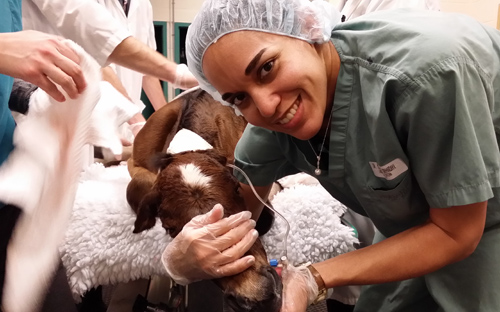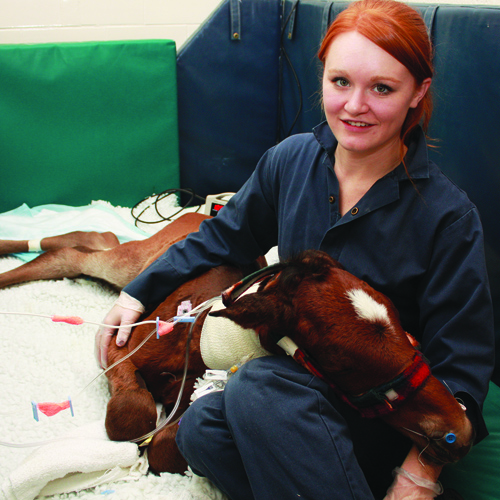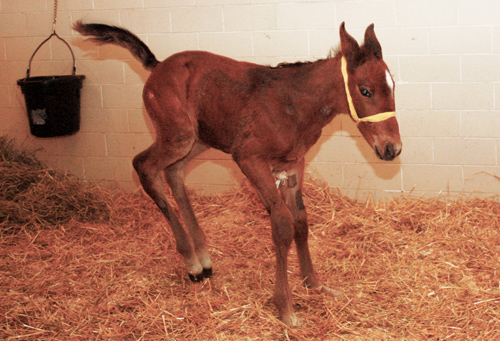By Jane Dawkins

Winter is well on its way, but January is the start of spring in the equine world as foaling season begins. In the large animal clinic at the Ontario Veterinary College (OVC), students are taking part in this special time of year through the OVC foal watch program.
From January to June, medical experts at the OVC Health Sciences Centre offer specialized equine services for premature or critically ill neonatal foals. Student volunteers in the foal watch program provide 24-hour monitoring during the foal’s first days of life.
“Much of our work is with high-risk mares, and while the number of foals in Ontario has reduced due to recent changes in the industry, there is still a strong need for advanced care for ailing foals,” says staff veterinarian Daniel Kenney.
“Our team of veterinary technicians and board-certified specialists – reproductive, internal medicine, surgical, diagnostic imaging and anesthesia specialists – combined with the support of our graduate and DVM students and, of course, our volunteers ensure we can create customized, comprehensive care plans that match individual animal and owner’s needs.”

Students taking part in the foal watch program gain valuable experience and learn about the clinical insight, diagnosis and resolution tactics that are required in intensive neonatal care for foals. Volunteers include veterinary students as well as undergraduates from across campus. Stephanie Nykamp, associate dean, clinical programs, says the foal watch program has even attracted the interest of high school students eager to join the team.
“This volunteer program is a great opportunity for our future vets to become familiar with the processes involved in delivering critical care and gives great exposure to the demands of working within the equine field itself,” she says.
Megan Perron, a DVM student, has been a foal watcher for six years, beginning as a rookie and now working as a team captain. “It’s hard not to get invested in the program,” says Perron. “I often find myself wandering into the wards when I’m not scheduled, just to check on the foal and get updates on its progress. I love learning about neonatal care and health as well as teaching the skills required to new members.”

This is Megan Neely’s second year on foal watch. The animal biology student says she joined the program because of her love of horses and her passion for equine medicine. “Foal Watch has given me the opportunity to observe and work with veterinarians, technicians and other students. I’ve learned a great deal with each new foal.” This year she’s helping teach new volunteers about intensive care for neonatal foals. She says this new responsibility is giving her a different perspective and a greater depth of knowledge. Neely plans to apply to OVC this year.
Neonatal care for foals is one of many reproductive services offered by OVC for the equine industry. OVC specialists also offer advanced reproductive diagnostic evaluation, ultrasound examination, fresh chilled or frozen semen, artificial insemination, embryo transfer, fertility evaluation, pregnancy monitoring and delivery.
Nykamp says these services and others offered through OVC’s Equine Sports Medicine and Reproduction Services are focused on quality of life and health care for breeding horses and equine athletes, particularly those in Ontario’s horse racing industry.
To learn more about Foal Watch, visit www.ovc.uoguelph.ca/foalwatch or www.facebook.com/foalwatch.
[slideshow gallery_id=”16″]